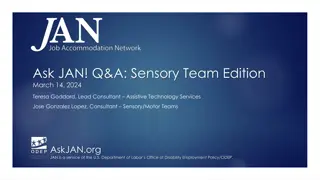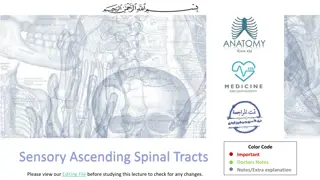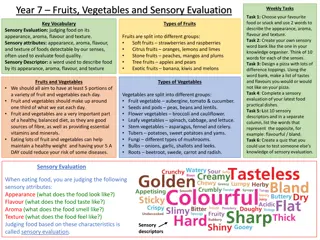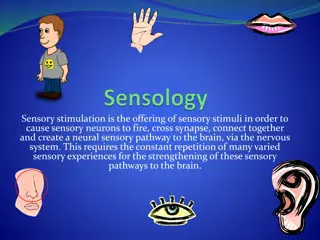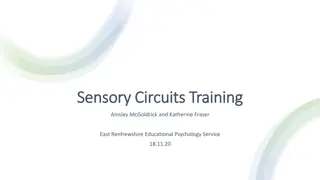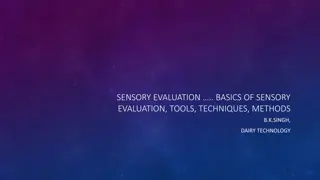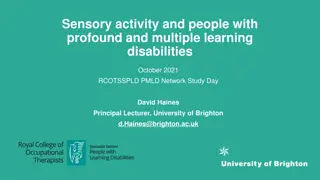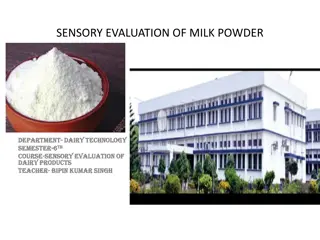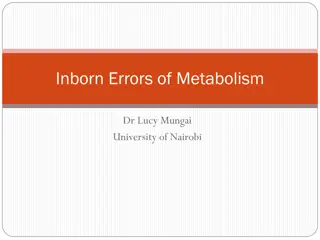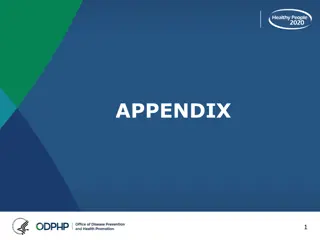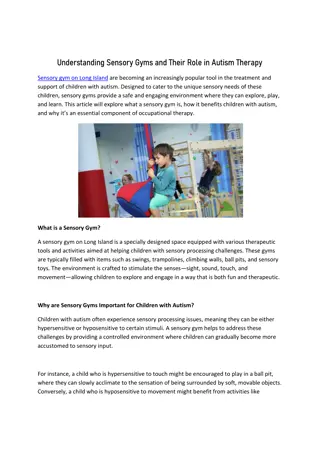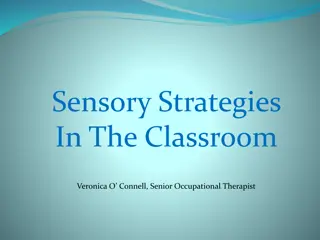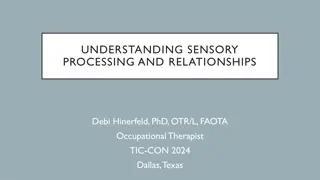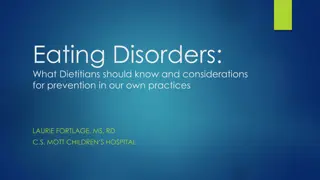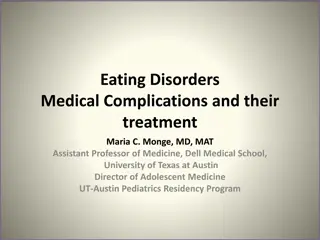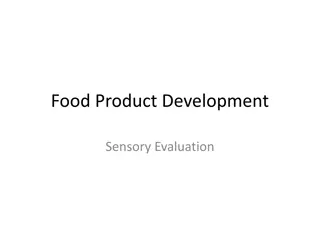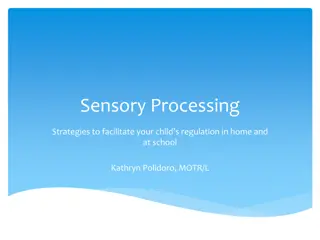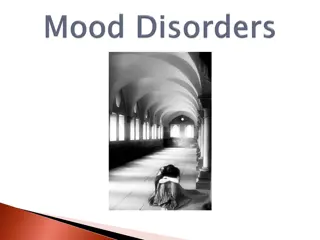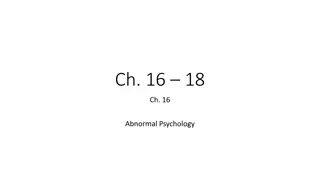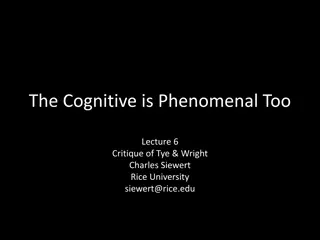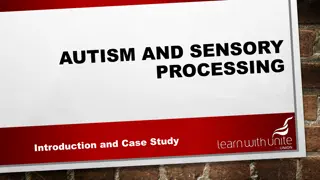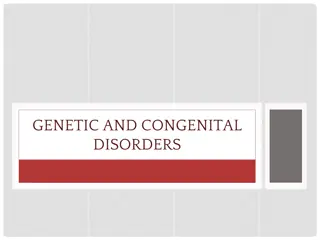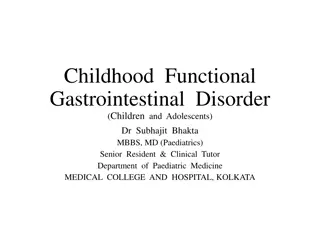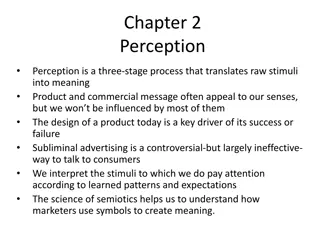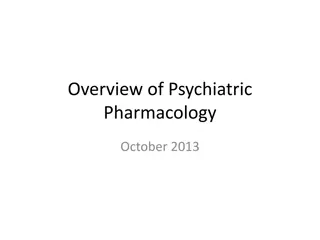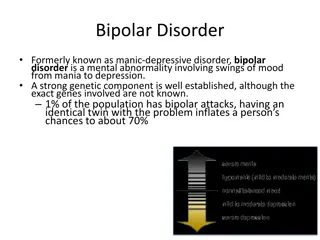Sensory Team Q&A Session Overview
Training overview for the Ask JAN Q&A: Sensory Team Edition on March 14, 2024. Learn about accommodation topics related to sensory impairments, respiratory conditions, digital accessibility, and more. Get insights from JAN consultants and engage in interactive discussions. Discover how JAN's Sensory
2 views • 30 slides
Sensory Ascending Spinal Tracts
Learn about sensory ascending spinal tracts, their classification, functions, and pathways. Explore how information is carried to the brain at conscious and subconscious levels through different types of sensations. Gain insights into the organization of white matter tracts and their importance in s
4 views • 22 slides
Exploring Fruits, Vegetables, and Sensory Evaluation in Food Science
Delve into the world of fruits, vegetables, and sensory evaluation through engaging tasks like describing favorite foods, creating sensory word banks, designing unique pizzas, and conducting sensory evaluations. Learn about different types of fruits and vegetables, their importance in a balanced die
0 views • 4 slides
Overview of Human Genetic Disorders
Human genetic disorders encompass a range of conditions, from recessive disorders like cystic fibrosis to dominant disorders such as Huntington's disease. Examples include cystic fibrosis, Huntington's disease, and sickle-cell anemia. Understanding genetic disorders involves research and awareness o
0 views • 10 slides
Sensory Stimulation for Neural Pathway Development
Sensory stimulation involves offering sensory stimuli to activate sensory neurons, cross synapses, and create neural pathways to the brain. Consistent exposure to varied sensory experiences is crucial for strengthening these pathways. The provided content includes activities such as introducing lear
0 views • 9 slides
Overview of Anxiety and Related Disorders
Anxiety disorders, such as PTSD, panic disorders, phobias, agoraphobia, and OCD, are characterized by varying degrees of fear and distress. Anxiety is a normal response to danger, but when it becomes chronic, it can lead to debilitating conditions. PTSD occurs post-trauma, panic disorders involve in
1 views • 42 slides
Understanding Sensory Circuits Training and Integration
Explore the importance of sensory circuits training, sensory integration needs, and the impact on sensory processing. Learn about the various sensory systems, components of sensory integration, and the challenges individuals may face with sensory processing difficulties. Discover strategies to suppo
0 views • 24 slides
Understanding Sensory Evaluation in Food Science
Sensory evaluation in food science involves analyzing human responses to the characteristics of food and beverages using the senses of sight, smell, taste, touch, and hearing. This scientific discipline aims to elicit, measure, analyze, and interpret reactions to the sensory attributes of food produ
0 views • 32 slides
Understanding Somatic Symptom Disorders, Conversion Disorders, and Dissociative Disorders
Somatic symptom disorders manifest as physical symptoms without apparent cause, while conversion disorders involve specific physical symptoms incompatible with medical conditions. Illness anxiety disorder involves interpreting normal sensations as disease symptoms. Dissociative disorders lead to a s
1 views • 41 slides
Understanding Sensory Activity for People with Profound Learning Disabilities
Exploring the importance of sensory activity for individuals with profound learning disabilities, this session delves into meaningful engagement through sensory experiences. Key findings from a 2018 survey are shared, highlighting the need for resource development and sharing. The focus is on sensor
0 views • 26 slides
Sensory Evaluation of Milk Powder in Dairy Technology: Flavors and Characteristics
Sensory evaluation is crucial for determining the quality and shelf life of milk powder products. This study focuses on sensory analysis methods to identify flavors and physical characteristics of whole milk powder, skim milk powder, and malted milk. It discusses common flavor defects, texture varia
2 views • 12 slides
Understanding Sensation and Perception in Psychology
Sensation and perception play crucial roles in how we interpret the world around us. Sensation is the process by which stimuli trigger our sensory receptors, while perception involves organizing and interpreting sensory information. This chapter delves into thresholds, sensory differences, Weber's L
0 views • 52 slides
Understanding Inborn Errors of Metabolism and Metabolic Disorders
Inborn Errors of Metabolism (IEM) are genetic disorders that disrupt metabolic pathways, leading to substrate accumulation or product deficiency. These disorders can be classified based on toxic accumulation, protein metabolism, carbohydrate intolerance, lysosomal storage issues, energy production d
0 views • 29 slides
Comprehensive Overview of Sensory and Communication Disorders Management
This document delves into various aspects of managing sensory and communication disorders, covering topics such as hearing evaluation, treatment referrals, use of assistive devices, tinnitus healthcare visits, balance and dizziness concerns, speech-language therapy, internet health care resources, a
4 views • 7 slides
Understanding Co-occurring Mental and Physical Health Conditions
Co-occurring mental and physical health disorders are prevalent and require an integrative multidisciplinary approach for effective assessment and treatment. This holistic approach helps address the complexity of managing multiple disorders in an integrated healthcare setting. Through a multi-direct
1 views • 37 slides
Understanding Sensory Gym on Long Island and Their Role in Autism Therapy
Sensory gym on Long Island are becoming an increasingly popular tool in the treatment and support of children with autism. Designed to cater to the unique sensory needs of these children, sensory gyms provide a safe and engaging environment where the
4 views • 3 slides
Understanding Functional GI Disorders: A Comprehensive Overview
Functional GI disorders encompass a range of conditions affecting the gastrointestinal system, such as irritable bowel syndrome and disorders of the gut-brain interaction. These disorders are characterized by no structural abnormalities but are influenced by factors like motility disturbance, viscer
0 views • 42 slides
Effective Strategies for Children with Developmental Language Disorder, Sensory Processing Disorder, and Fine Motor Delays
Children with Developmental Language Disorder (DLD), Sensory Processing Disorder (SPD), and Fine Motor Delays often have accompanying sensory and fine motor deficits. Research indicates that addressing sensory processing deficits can significantly benefit children with DLD, ADHD, autism, and other d
0 views • 61 slides
Understanding Sensory Strategies in the Classroom
Explore sensory modulation and its impact on everyday activities. Gain knowledge of sensory systems, levels of alertness, and practical strategies for regulating sensory input in educational settings. Discover the hidden senses, cognitive strategies, and techniques to maintain the Just Right State f
0 views • 37 slides
Understanding Genetic Disorders and Their Impact on Health
Genetic disorders are caused by abnormalities in genes or chromosomes, leading to various health conditions. Inherited disorders can be passed down from parents to children, affecting physical makeup and processes in the body. In India, there is a high prevalence of genetic disorders, particularly i
1 views • 12 slides
Understanding Sensory Processing and Relationships: Exploring Individual Differences
Explore the intricate connections between sensory processing and behavioral responses, delving into how individual variations in sensory patterns can impact relationships, engagement, and daily routines. Gain insights into the significance of sensory experiences in nurturing brain function, and lear
0 views • 29 slides
Understanding Eating Disorders: Types, Signs, Effects, and Recovery
Eating disorders are mental disorders characterized by unhealthy eating habits and can have severe physical and psychological consequences. This article explores the definition of eating disorders, signs to look out for, different types such as Anorexia Nervosa, Bulimia Nervosa, Pica, and Purging Di
0 views • 10 slides
Understanding Eating Disorders: Insights for Dietitians
Eating disorders are complex neurobiological conditions that are not merely about control or weight management. These disorders can affect individuals of all genders, body sizes, and socioeconomic backgrounds. Dietitians play a crucial role in identifying, assessing, and treating eating disorders, a
0 views • 41 slides
Understanding Eating Disorders: Medical Complications and Treatment
This presentation by Dr. Maria C. Monge covers the common eating disorders in teenage patients, potential medical complications, and the role of the medical team in treatment. It includes definitions of disorders like Anorexia Nervosa, Bulimia Nervosa, and Binge Eating Disorder according to DSM-5 cr
0 views • 60 slides
Understanding Sensory Evaluation in Food Product Development
Sensory evaluation in food product development involves measuring, analyzing, and interpreting how food characteristics are perceived by the senses. This process helps in understanding organoleptic properties, conducting different types of sensory tests such as discrimination and descriptive tests,
0 views • 35 slides
Understanding Neurodevelopmental Disorders in Childhood and Adolescence
Neurodevelopmental disorders in childhood and adolescence encompass a range of conditions including intellectual disabilities, communication disorders, autism spectrum disorder, and attention deficit/hyperactivity disorder. These disorders impact cognitive development, adaptive functioning, and comm
0 views • 30 slides
Understanding Sensory Processing in Children: Strategies for Home and School
Sensory processing plays a crucial role in how individuals respond to stimuli. When not developed properly, it can lead to various challenges affecting learning, behavior, and social engagement. This article explores sensory processing strategies to help children regulate their responses at home and
0 views • 19 slides
Understanding Sleep Disorders: Classification and Diagnosis
Sleep disorders encompass various conditions affecting sleep patterns and quality. They are classified into categories such as insomnia, sleep-related breathing disorders, central disorders of hypersomnolence, circadian rhythm sleep-wake disorders, parasomnias, and sleep-related movement disorders.
0 views • 32 slides
Understanding Grief and Depressive Disorders: A Comparative Analysis
Grief and depressive disorders share similarities but also have distinct differences. Grief is a universal emotional state following loss, while depressive disorders involve prolonged mood disturbances. The stages of grief include denial, anger, bargaining, depression, and acceptance, with intervent
0 views • 79 slides
Understanding Genetic Disorders and the Human Genome Project
The Human Genome Project, completed in 2003, aimed to identify all human genes and DNA sequences. Genetic disorders, like autosomal disorders and Huntington's disease, can result from mutations at different levels, affecting single genes, chromosomes, or multiple genes. Albinism and cystic fibrosis
0 views • 37 slides
Understanding Abnormal Psychology: Disorders, Symptoms, and Treatments
Explore the world of abnormal psychology through the lens of different disorders like depression, anxiety, and phobias. Learn about the definitions of abnormal behavior, DSM-V classifications, and various types of psychological disorders. Delve into the complexities of mental health conditions such
0 views • 39 slides
Exploring Phenomenal Consciousness: Reducibility, Variation, and Cognitive Phenomenology
Delve into the rich realm of phenomenal consciousness, dissecting the interplay between sensory and conceptual elements. Contemplate the essence of cognitive activity, sensory features, and the potential inclusion of non-sensory aspects within consciousness. As you ponder reducibility, variation, an
0 views • 28 slides
Understanding Sensory Overload: A Day in the Life of Logan with Sensory Processing Disorder
Explore Logan's daily experiences as a 9-year-old boy with sensory processing disorder, delving into how various sensory stimuli impact his routines. From waking up to challenges with food textures, this case study sheds light on the complexities of sensory overload in individuals like Logan.
0 views • 36 slides
Overview of Classification of Psychiatric Disorders
Psychiatric disorders are illnesses with various manifestations that impact functioning due to disturbances in biological, social, genetic, and other factors. Two key classification systems, ICD-10 and DSM-5, categorize over 200 types of psychiatric illnesses. The ICD-10 includes categories like org
0 views • 18 slides
Overview of Genetic and Congenital Disorders and Their Causes
Explore the terminology, causes, characteristics, and results of genetic and congenital disorders, as well as the disorders of single-gene inheritance. Learn about autosomal dominant disorders like Marfan Syndrome and Neurofibromatosis. Discover how single-gene disorders are inherited and their impa
0 views • 24 slides
Understanding Childhood Functional Gastrointestinal Disorders
Functional Gastrointestinal Disorders (FGIDs) in children and adolescents are characterized by chronic or recurring symptoms that cannot be fully explained by current structural or biochemical tests. These disorders emphasize the role of normal development in symptom presentation and the lack of evi
0 views • 46 slides
Understanding the Three-Stage Process of Perception
Perception is a complex three-stage process that involves translating raw stimuli into meaning. This process includes sensation, where sensory receptors respond to stimuli, and perception, where sensations are organized and interpreted. Marketers leverage sensory cues such as colors, sounds, and odo
0 views • 8 slides
Understanding Sensory Evaluation: Influences on Food Choices and Evaluation Techniques
Explore the sensory evaluation of food in Chapter 6, focusing on factors influencing food choices such as culture, emotions, and health concerns. Learn about sensory characteristics affecting preferences, taste perception, and the scientific approach to evaluating food through sight, smell, taste, t
0 views • 11 slides
Overview of Psychiatric Pharmacology: A Comprehensive Guide from 2013
This presentation delves into the nuances of psychiatric pharmacology, exploring common psychiatric conditions, historical perspectives on medical treatments, categories of psychiatric medications, and principles of treatment. It also touches on mental illness definitions from DSM-IV-TR and DSM-V, a
0 views • 27 slides
Understanding Mental Health Disorders: Bipolar Disorder, Anxiety Disorders, & More
Exploring various mental health disorders such as Bipolar Disorder, Anxiety Disorders, Generalized Anxiety Disorder, Panic Disorder, and Phobic Disorders. Learn about their symptoms, prevalence, and impacts on individuals' lives.
0 views • 41 slides
